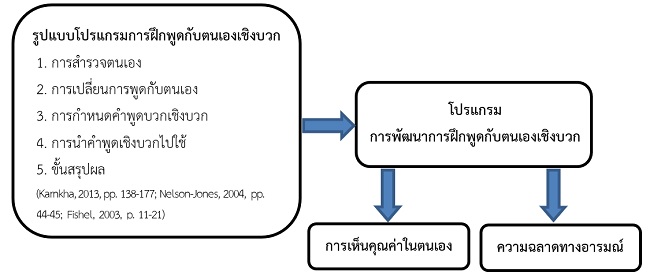การพัฒนาโปรแกรมฝึกพูดกับตนเองเชิงบวกเพื่อส่งเสริมความฉลาดทางอารมณ์และการเห็นคุณค่าในตนเองของนักศึกษาคณะครุศาสตร์ มหาวิทยาลัยราชภัฏสุราษฎร์ธานี
DOI:
https://doi.org/10.14456/nrru-rdi.2021.11คำสำคัญ:
โปรแกรมการฝึกพูดกับตนเองเชิงบวก, ความฉลาดทางอารมณ์, การเห็นคุณค่าในตนเองบทคัดย่อ
การวิจัยครั้งนี้มีวัตถุประสงค์เพื่อ 1) พัฒนาโปรแกรมฝึกพูดกับตนเองเชิงบวก 2) เปรียบเทียบความฉลาดทางอารมณ์และการเห็นคุณค่าในตนเองของนักศึกษา ก่อนและหลังการใช้โปรแกรมฝึกพูดกับตนเองเชิงบวก กลุ่มตัวอย่างได้มาโดยวิธีการเลือกกลุ่มตัวอย่างอย่างง่าย ด้วยวิธีการจับฉลาก 1 ห้องเรียน ได้นักศึกษาชั้นปีที่ 1 หลักสูตรสาขาวิชาสังคมศึกษา คณะครุศาสตร์ มหาวิทยาลัยราชภัฏสุราษฎร์ธานี ภาคเรียนที่ 1 ปีการศึกษา 2562 จำนวน 30 คน เครื่องมือที่ใช้ในการวิจัยได้แก่ แบบประเมินความเหมาะสมของกิจกรรม มีค่าเฉลี่ย 4.22 แบบประเมินความฉลาดทางอารมณ์ของกรมสุขภาพจิต และแบบวัดการเห็นคุณค่าในตนเอง มีค่าความเชื่อมั่นเท่ากับ 0.933 เก็บรวบรวมข้อมูลจากการเข้าร่วมโปรแกรมฝึกพูดกับตนเองเชิงบวก จำนวน 8 กิจกรรม ใช้เวลากิจกรรมละ 60-90 นาที เป็นเวลา 6 สัปดาห์ วิเคราะห์ข้อมูลโดยการหาค่าเฉลี่ย ( ) ส่วนเบี่ยงเบนมาตรฐาน (S.D.) การหาค่าประสิทธิภาพ (E1/E2) และการทดสอบค่าที (t-test for dependent samples) ผลการวิจัยสรุปได้ดังนี้
- ประสิทธิภาพของโปรแกรมฝึกพูดกับตนเองเชิงบวกสำหรับนักศึกษาคณะครุศาสตร์ มหาวิทยาลัยราชภัฏสุราษฎร์ธานี มีค่าประสิทธิภาพเท่ากับ 78.48/80.84
- หลังการใช้โปรแกรมฝึกพูดกับตนเองเชิงบวก นักศึกษามีคะแนนความฉลาดทางอารมณ์สูงกว่าก่อนการใช้โปรแกรมฝึกพูดกับตนเองเชิงบวก อย่างมีนัยสำคัญทางสถิติที่ระดับ 0.05
- หลังการใช้โปรแกรมฝึกพูดกับตนเองเชิงบวก นักศึกษามีคะแนนการเห็นคุณค่าในตนเองสูงกว่าก่อนการใช้โปรแกรมฝึกพูดกับตนเองทางบวก อย่างมีนัยสำคัญทางสถิติที่ระดับ 0.05
เอกสารอ้างอิง
Buchanan, R., Gueldner, B. A., Tran, O. K., & Merrell, K. W. (2009). Social and emotional learning in classrooms: A survey of teachers’ knowledge, perceptions, and practices. Journal of Applied School Psychology, 25(2), 187-203.
Chaiseutong, K. (2005). Factor affecting self esteem of graduate students of Mahildol University. Thesis, Master of Education Program in Educational Psychology, Srinakharinwirot University, Bangkok. (In Thai)
Coopersmith, S. (1981). The Antecedents of self-esteem. San Francisco : W.H. Freeman and Company.
Cypert, S.A. (1994). The Power of Self-esteem. New York : American Management Association.
Depape, A.-M. R., Hakim-Larson, J., Voelker, S., Page, S., & Jackson, D. L. (2006). Self-Talk and Emotional Intelligence in University Students. Canadian Journal of Behavioural Science, 38(3), 250-260.
Department of Mental Health. (2000). EQ : Emotional Quotient (3rd ed.). Nonthaburi : Office of Mental Health Development. (In Thai)
Fishel, R. (2003). Change Almost Anything in 21 Days: Recharge your life with the power of over 500 affirmations. Florida : Health communications.
Goleman, D. (1998). Working with emotional intelligence. New York : Bantam Books.
Jennings, P. A. (2016). CARE for teachers: A mindfulness-based approach to promoting teachers’ social and emotional competence and well-being. In A. S.-R. Kimberly & W. R. Robert (Eds.), Handbook of mindfulness in education (pp. 133-148). Retrieved February 25, 2019, from http://link.springer.com/ chapter/10.1007/978-1-4939-3506-2_9
Jennings, P. A., & Greenberg, M. T. (2009). The prosocial classroom: Teacher social and emotional competence in relation to student and classroom outcomes. Review of Educational Research, 79(1), 491-525.
Karnkha, O. (2013). The Effects of Positive Self-Talk Training program on Emotional Intelligence of The First Year Students of Nakhon Ratchasima Rajabhat University. Thesis, Master of Education Program in Educational Psychology, Nakhon Ratchasima Rajabhat University, Nakhon Ratchasima. (In Thai)
Khantiya, S. (2009). Some factor related to Emotional Quotient and Learning Achievement of Mathayomsuksa 3 students unter the Office of Loei Educational Service Area 1. Thesis, Master of Education Program in Educational Research and Evaluation, Loei Rajabhat University, Loei (In Thai)
Khongram, S. (2010). The effects of group counseling based on The Rational Emotive Behavior Theory on Self-Esteem and sexual risk behavior of female adolescents. Thesis, Master of Education Program in Educational Psychology and Counseling, Khon Kaen University, Khon Kaen. (In Thai)
Mahachoklertwattana, K. (2011). The effects of a positive self-talk training program on self-esteem of fourth grade student. Thesis, Master of Education degree in Education Psychology, Chulalongkorn University, Bangkok. (In Thai)
Maltz, M. (1969). Psycho-Cybernetics. New York : Prentice-Hall.
Meeraka, P. (2017). Teacher’s Characteristic of 21st Century. MBU Education Journal : Faculty of Education Mahamakut Buddhist University, 5(2), 24-35. (In Thai)
Nam-Muang, C. (2012). Teacher personality and good teaching characteristics. Journal of Graduate Studies Review, (Phayao Campus, 2012). (In Thai)
Nasawat, N. (2016). Impacts of healthy classroom climate on student teachers’ social emotional competence and its consequences. Thesis, Master of Education Program in Educational Research Methodology, Chulalongkorn University, Bangkok. (In Thai)
Nelson-Jones, R. (2004). Effective thinking skill (4th ed). London : SAGE.
Nikommanon, P. (1996). Foundation of Research. Bangkok : Aksarapipat. (In Thai)
Nunark, P. (2014). The using group activities to develop Self-Esteem of student teachers in the faculty of education in Suratthani Rajabhat University. Research report. Suratthani Rajabhat University, Suratthani. (In Thai)
Office of the Education Council. (2017). National Education Plan 2017-2036. Bangkok : Office of the Education Council. (In Thai)
Özer E., Hamarta E. l, Deniz M. E. (2015). Emotional Intelligence, Core-Self -Evaluation, and Life Satisfaction Psychology, 7, 145-153.
Patphayoon, C., Lertratdechakul, C., & Pathanapakdee, N. (2011). Self-Adjustment ability of first year students in public university. The journal of KMUTNB, 21(1), 157-166. (In Thai)
Pongjanta, R. N. (2016). Emotional Intelligence for Education. Retrieved February 25, 2019, from https://www.gotoknow.org/posts/273923 (In Thai)
Punsuwun, S., Mahakittikun, K., Uthchachon, P., & Kanathum, U. (2017). Effects of Positive Self-Talk Training program on Self-Esteem and Psychological Well-being among Pregnant Adolescents. Songklanagarind Journal of Nursing, 37(2), 77-89. (In Thai)
Silawan, R. (2002). Effects of Neo-Humanist Based Asanas and Meditation Practices on Self-esteem of Children in Chiang Mai Home for boys. Thesis, Master of Educational Program in Psychology and Guidance, Chiang Mai University, Chiang Mai. (In Thai)
Suwetwatin, D. (2018). Targeting Thais to eat 50% more vegetables and fruits in 2001. Thai Health Promotion Foundation. Retrieved from October 22, 2019, from https://bit.ly /2totujH (In Thai)
Thamrongsotthisakul, S. (2007). Developing Self-Awareness of Emotional Quotient of The Gifted in Prathom Suksa IV by using group activities. Thesis, Master of Education Program in Special Education, Srinakharinwirot University, Bangkok. (In Thai)
Wasupanjit, A. (2018). Interview “21 days to build habits by yourself”. Post today. Retrieved November 1, 2018, from https://www.posttoday.com/life/healthy/569487 (In Thai)
Zourbanos, N., Papaioannou, A., Argyropoulou, E., & Hatzigeorgiadis, A. (2014). Achievement goals and self-talk in physical education: The moderating role of perceived competence. Motivation and Emotion, 38(2), 235-251.





